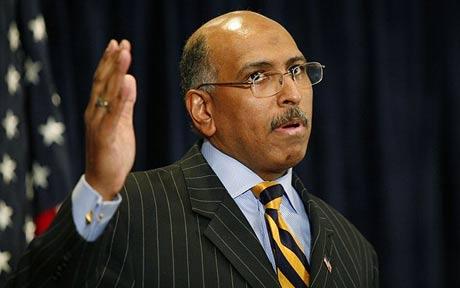Next month the Republican National Committee will elect a chairman to lead their party into the 2012 presidential election.
Current chairman Michael Steele, who has been a source of controversy throughout his two year tenure, is being challenged by a number of candidates.
Many Republicans are unhappy with Steele’s leadership style and management. But despite the relevance of these concerns, they should not be the central issue.
Of central concern should be crystallizing the Republican Party’s vision for our nation and electing a chairman in tune with this vision, committed to it, and capable of rallying the party and the nation around it.
Despite the sweeping Republican victory in the 2010 congressional elections, there’s little evidence that the election reflected a new love affair between voters and the Republican Party. Much work remains to be done to restore party credibility.
In a Wall Street Journal/NBC poll released a few days ago, 42% of respondents said they plan to vote for President Obama in 2012 against 39% who indicated they’d vote for the Republican candidate. In a match up against Mitt Romney, 47% picked Obama versus 40% for Romney. Against Sarah Palin, 55% said they’d vote for Obama versus 33% for Palin.
If some of the logic in Steele’s selection two years ago was that a black chairman would expand Republican Party appeal to minority voters, there’s scant evidence that this was accomplished.
Nationwide, the black and Hispanic vote in 2010 showed little Republican gains over 2008, with 90% of blacks and 66% of Hispanics voting for Democrats.
Two black Republicans were elected to congress. But their victories were in largely white districts and came as result of both being solid conservatives in a year when this is what voters were looking for.
Similarly, although Florida elected an Hispanic Republican Senator, and New Mexico and Nevada Hispanic Republican governors, Hispanic voters played a key role in defeating Sharron Angle in her challenge to Harry Reid in Nevada, and a large Hispanic Democratic vote in California insulated Democrats in that state from the Republican onslaught that succeeded in other parts of the country.
To win hearts and minds of black and Hispanic voters, the issue isn’t the ethnicity of the party chairman, but the clarity of the relevance of the party’s agenda to them.
Nor can Republicans rest comfortably with the working class white Independent voters that made all the difference in 2010. These are the same voters who helped elect Barack Obama in 2008 and helped deliver the congress to Democrats in 2006.
In the Wall Street Journal/NBC poll, 64% of Independents said Republicans should compromise, and not stick to principle, in order to pass legislation.
And the poll shows little national consensus behind the Tea Party movement. Only 29% say they support the movement and 33% say they see it in a favorable light, compared to 37% that see it unfavorably.
The point is that these are not normal times. Fixing our country requires pulling weeds out by their roots, not trimming their leaves.
If the Republican Party is going to restore its credibility, it must provide a clear, principled and compelling conservative alternative to current liberal leadership.
Killing Democrats’ $1.3 trillion omnibus spending bill is a good start. But stopping a pork laden spending bill with 6500 earmarks, at a time when the public clearly doesn’t want this sort of thing, is a victory, but not a great one.
Tough battles ahead must be about taking on health care and reforming our entitlements and our schools. And despite sentiment to keep social issues off the table, these issues are crucial for winning over minority voters.
Steele must show he’s up to these formidable challenges if he wants to retain the RNC chairman post

COMMENTS
Please let us know if you're having issues with commenting.